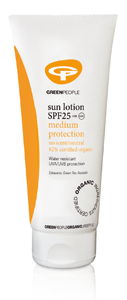Nowadays, people have a lot more sense when it comes to the sun. With the increase of beauty/health blogs and magazines posting articles about the negative consequences of excessive sun exposure on our skin, more and more people are aware that sun bathing really isn't safe or necessary.
The biggest threat of all, of course, is skin cancer. Personally, I know someone who has been affected by this, and to this day they admit that one of their biggest regrets in life is being so careless about how they handled their skin in the sun. You could argue that there wasn't always as much information about the dangers of sun exposure, but nowadays we really have no excuse to not protect our skin!
Premature ageing of the skin is also an issue with excessive exposure to the sun's rays. Fibres in the skin called elastin are damaged over time from exposure to the sun's ultraviolet (UV) rays. It is the breaking down of these fibres that cause the skin to stretch, sag and lose its ability to bounce back into place after stretching. The destruction of elastic and collagen tissues also cause fine lines and wrinkles and cause the skin to bruise and tear more easily, taking longer to heal. So, while overexposure to the sun may not be apparent when we are young, it will definitely show later in life.
Choosing a sunscreen type:
It's important to know that there are two different types of sunscreen, chemical sunscreens and physical sunscreens. Chemical sunscreens use chemical UV filters, while physical sunscreens use physical UV filters.
Chemical sunscreen
Chemical sunscreens are the most common sun protection and the one you will see dominating the shelves in the sunscreen aisle. These creams work by absorbing the energy of UV radiation before it affects your skin. Chemical SPFs can contain the following ingredients: Octylcrylene, Avobenzone, Octinoxate, Octisalate, Oxybenzone, Homosalate, Helioplex, 4-MBC, Mexoryl SX and XL, and Tinosorb S and M. These chemical filters often tend to be irritating to the skin. If they get in or around your eyes they can cause swelling or irritation. You may also find that if you are on holidays somewhere hot and you are wearing this type of sunscreen on your face every day, you may develop some temporary acne and/or iritation of the skin, even if it is marketed as specifically for the face.
Some dermatologists have came out and argued that the chemicals used in these sunscreens can actually be harmful, causing disruption of some hormones and even causing cell damage. There are several suspected dangers associated with benzophenone-3 (oxybenzone, listed above). This sunscreen agent has been shown to penetrate the skin and cause photo-sensitivity. In some studies, the presence of benzophenone-3 has demonstrated an increase in the production of harmful free radicals and an ability to attack DNA cells. For this reason, it is believed to be a contributing factor in the recent rise of melanoma cases with sunscreen users. Some studies have shown it to behave similarly to the hormone oestrogen, suggesting that it may cause breast cancer (This would probably be fairly uncommon, but obviously there could still be a slight risk.) It has also been linked to contact eczema and allergies.
Physical sunscreen
Physical sunscreens contain titanium dioxide, zinc oxide, or a mixture of both minerals, which physically block ultraviolet radiation (UVR). This type of sunscreen provides broad protection against both UVA and UVB rays.
Physical SPF filters act like millions of tiny mirrors on the skin's surface, which bounce the sun's rays back off the skin. Because they contain physical blocking agents and not chemical ones, they are especially useful for individuals with sensitive skin, and rarely cause skin irritation. As well as this, titanium dioxide and zinc oxide are not pore-blocking, so neither of these minerals will cause breakouts of the skin, which is always a plus! They protect against the entire spectrum of UVA and UVB rays. This is one reason why people who suffer with melasma (hyper-pigmentation of the skin) must ensure they use physical sunblock as they need this broad spectrum protection against both UVA and UVB. Chemical sunscreens, which absorb the light, can worsen this skin condition.
Because physical sunscreens are suitable for sensitive skin, they can be used around the eyes. People often forget to protect this part of the face with sunscreen but it is just as, if not even more important!
So while chemical sunscreens are cheaper and easier to source, in my opinion physical sunscreens are the safer, more beneficial option. In summary, here are some of their benefits!
- Provide a broad range of both UVA and UVB protection
- Do not clog pores
- Are non irritating and gentle on the skin
- Do not cause any free radicals
- Do not contain any dangerous chemicals that seep into the skin
- Protect melasma from worsening/prevent hyper-pigmentation
So if you read this and decide to opt for a physical sunscreen, all you have to do is read the back of the sunscreen label and look for either titanium dioxide, zinc oxide, or both. And remember, the suns rays are just as harmful in the winter months as the rays penetrate through the clouds, even if it's not technically sunny out! So be sure to protect your skin and wear an SPF all year round, and re-apply often!
Green People Ireland are an Irish company that do a great range of organic, chemical-free sun creams. This one, with SPF 25 is great for every day protection from the sun.
Another great brand is Badger Organics, which you can buy online here.
Sinéad


No comments:
Post a Comment